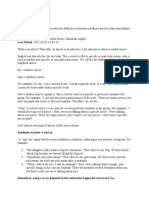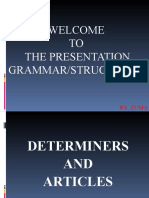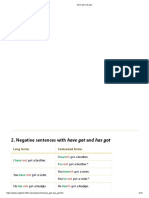Using Articles in Grammar
Uploaded by
Yahushua Ben JudahUsing Articles in Grammar
Uploaded by
Yahushua Ben JudahUsing Articles in grammar
Summary: This handout discusses the differences between indefinite articles (a/an) and definite articles (the). Contributors:Paul Lynch, Allen Brizee, Elizabeth Angeli Last Edited: 2011-03-03 10:04:28
What is an article? Basically, an article is an adjective. Like adjectives, articles modify nouns. English has two articles: the and a/an. The is used to refer to specific or particular nouns; a/an is used to modify non-specific or non-particular nouns. We call the the definite article and a/an the indefinite article. the = definite article a/an = indefinite article For example, if I say, "Let's read the book," I mean a specific book. If I say, "Let's read abook," I mean any book rather than a specific book. Here's another way to explain it: The is used to refer to a specific or particular member of a group. For example, "I just saw the most popular movie of the year." There are many movies, but only one particular movie is the most popular. Therefore, we use the. "A/an" is used to refer to a non-specific or non-particular member of the group. For example, "I would like to go see a movie." Here, we're not talking about a specific movie. We're talking about any movie. There are many movies, and I want to see any movie. I don't have a specific one in mind. Let's look at each kind of article a little more closely.
Indefinite Articles: a and an
"A" and "an" signal that the noun modified is indefinite, referring to any member of a group. For example:
"My daughter really wants a dog for Christmas." This refers to any dog. We don't know which dog because we haven't found the dog yet. "Somebody call a policeman!" This refers to any policeman. We don't need a specific policeman; we need any policeman who is available. "When I was at the zoo, I saw an elephant!" Here, we're talking about a single, non-specific thing, in this case an elephant. There are probably several elephants at the zoo, but there's only one we're talking about here.
Remember, using a or an depends on the sound that begins the next word. So...
a + singular noun beginning with a consonant: a boy; a car; a bike; a zoo; a dog an + singular noun beginning with a vowel: an elephant; an egg; an apple; an idiot;an orphan a + singular noun beginning with a consonant sound: a user (sounds like 'yoo-zer,' i.e. begins with a consonant 'y' sound, so 'a' is used); a university; a unicycle an + nouns starting with silent "h": an hour a + nouns starting with a pronounced "h": a horse
In some cases where "h" is pronounced, such as "historical," you can use an. However, a is more commonly used and preferred. A historical event is worth recording.
Remember that these rules also apply when you use acronyms: Introductory Composition at Purdue (ICaP) handles first-year writing at the University. Therefore, an ICaP memo generally discusses issues concerning English 106 instructors.
Another case where this rule applies is when acronyms start with consonant letters but have vowel sounds: An MSDS (material safety data sheet) was used to record the data. An SPCC plan (Spill Prevention Control and Countermeasures plan) will help us prepare for the worst.
If the noun is modified by an adjective, the choice between a and an depends on the initial sound of the adjective that immediately follows the article:
a broken egg an unusual problem a European country (sounds like 'yer-o-pi-an,' i.e. begins with consonant 'y' sound)
Remember, too, that in English, the indefinite articles are used to indicate membership in a group:
I am a teacher. (I am a member of a large group known as teachers.) Brian is an Irishman. (Brian is a member of the people known as Irish.) Seiko is a practicing Buddhist. (Seiko is a member of the group of people known as Buddhists.)
Definite Article: the
The definite article is used before singular and plural nouns when the noun is specific or particular. The signals that the noun is definite, that it refers to a particular member of a group. For example: "The dog that bit me ran away." Here, we're talking about a specific dog, the dog that bit me. "I was happy to see the policeman who saved my cat!" Here, we're talking about a particular policeman. Even if we don't know the policeman's name, it's still a particular policeman because it is the one who saved the cat. "I saw the elephant at the zoo." Here, we're talking about a specific noun. Probably there is only one elephant at the zoo.
Count and Noncount Nouns
The can be used with noncount nouns, or the article can be omitted entirely.
"I love to sail over the water" (some specific body of water) or "I love to sail over water" (any water). "He spilled the milk all over the floor" (some specific milk, perhaps the milk you bought earlier that day) or "He spilled milk all over the floor" (any milk).
"A/an" can be used only with count nouns.
"I need a bottle of water." "I need a new glass of milk."
Most of the time, you can't say, "She wants a water," unless you're implying, say, a bottle of water.
Geographical use of the
There are some specific rules for using the with geographical nouns. Do not use the before:
names of most countries/territories: Italy, Mexico, Bolivia; however, the Netherlands,the Dominican Republic, the Philippines, the United States names of cities, towns, or states: Seoul, Manitoba, Miami names of streets: Washington Blvd., Main St. names of lakes and bays: Lake Titicaca, Lake Erie except with a group of lakes likethe Great Lakes names of mountains: Mount Everest, Mount Fuji except with ranges of mountains likethe Andes or the Rockies or unusual names like the Matterhorn names of continents (Asia, Europe) names of islands (Easter Island, Maui, Key West) except with island chains like theAleutians, the Hebrides, or the Canary Islands
Do use the before:
names of rivers, oceans and seas: the Nile, the Pacific points on the globe: the Equator, the North Pole geographical areas: the Middle East, the West
deserts, forests, gulfs, and peninsulas: the Sahara, the Persian Gulf, the Black Forest, the Iberian Peninsula
Omission of Articles
Some common types of nouns that don't take an article are:
Names of languages and nationalities: Chinese, English, Spanish, Russian (unless you are referring to the population of the nation: "The Spanish are known for their warm hospitality.") Names of sports: volleyball, hockey, baseball Names of academic subjects: mathematics, biology, history, computer science
You might also like
- How To Use Articles (A - An - The) - Purdue OWL® - Purdue UniversityNo ratings yetHow To Use Articles (A - An - The) - Purdue OWL® - Purdue University5 pages
- Using Articles: Indefinite Articles: A and AnNo ratings yetUsing Articles: Indefinite Articles: A and An3 pages
- Grammar: Definite Article and A/an The Indefinite ArticleNo ratings yetGrammar: Definite Article and A/an The Indefinite Article6 pages
- Indefinite Articles: And: A/an A/an A/anNo ratings yetIndefinite Articles: And: A/an A/an A/an3 pages
- Using Articles: Indefinite Articles: A and AnNo ratings yetUsing Articles: Indefinite Articles: A and An3 pages
- A, An or The?: The and A/an Are Called "Articles". We Divide Them Into "Definite" and "Indefinite" Like ThisNo ratings yetA, An or The?: The and A/an Are Called "Articles". We Divide Them Into "Definite" and "Indefinite" Like This5 pages
- Articles: Success Coaching Centre SEC.-14, SEC.-4 9784094650, 9214520688No ratings yetArticles: Success Coaching Centre SEC.-14, SEC.-4 9784094650, 92145206883 pages
- Definite Indefinite Articles English Brief ExplanationNo ratings yetDefinite Indefinite Articles English Brief Explanation4 pages
- Any Book Rather Than A Specific Book.: A/an A/an A/anNo ratings yetAny Book Rather Than A Specific Book.: A/an A/an A/an6 pages
- Use of Article: What Is An Article? Basically, An Article Is An Adjective. Like Adjectives, Articles Modify NounsNo ratings yetUse of Article: What Is An Article? Basically, An Article Is An Adjective. Like Adjectives, Articles Modify Nouns8 pages
- Rticles: The Is Used To Refer To Specific or Particular Nouns A/an Is Used To Modify Non-Specific orNo ratings yetRticles: The Is Used To Refer To Specific or Particular Nouns A/an Is Used To Modify Non-Specific or3 pages
- English Articles (A, An and The) English Articles (A, An and The)No ratings yetEnglish Articles (A, An and The) English Articles (A, An and The)20 pages
- Articles: A/an/the: Aptachaitanya & John Leads - English TrainingNo ratings yetArticles: A/an/the: Aptachaitanya & John Leads - English Training21 pages
- Eterminers - Htm#articles: The Teacher, A College, A Bit of Honey, That Person, Those People, WhateverNo ratings yetEterminers - Htm#articles: The Teacher, A College, A Bit of Honey, That Person, Those People, Whatever4 pages
- How To Use Articles (A - An - The) - Purdue Writing LabNo ratings yetHow To Use Articles (A - An - The) - Purdue Writing Lab5 pages
- Welcome TO The Presentation Grammar/Structure 1: By: ZumaNo ratings yetWelcome TO The Presentation Grammar/Structure 1: By: Zuma29 pages
- We Usually Use No Article To Talk About Things in General - The Doesn't Mean AllNo ratings yetWe Usually Use No Article To Talk About Things in General - The Doesn't Mean All13 pages
- Прво има еден дел во црвено кој не e потребен само тука е за секој случај ако нешто плус и текне да прашува, иначе само тоа во црно е потребно. ArticlesNo ratings yetПрво има еден дел во црвено кој не e потребен само тука е за секој случај ако нешто плус и текне да прашува, иначе само тоа во црно е потребно. Articles11 pages
- Articles: Articles Are Words That Define A Noun As Specific or UnspecificNo ratings yetArticles: Articles Are Words That Define A Noun As Specific or Unspecific12 pages
- Rules of Using Articles With Example: Using Indefinite Article: A & AnNo ratings yetRules of Using Articles With Example: Using Indefinite Article: A & An3 pages
- Confusing Words, Including Heteronyms; Or Why English is Difficult to LearnFrom EverandConfusing Words, Including Heteronyms; Or Why English is Difficult to LearnNo ratings yet
- Lesson 03 - Charles F. Haanel - Understand The Universal SystemNo ratings yetLesson 03 - Charles F. Haanel - Understand The Universal System16 pages
- These Seven Habits:1. Be Proactive2. Begin With The End in Mind3No ratings yetThese Seven Habits:1. Be Proactive2. Begin With The End in Mind33 pages
- These Seven Habits:1. Be Proactive2. Begin With The End in Mind3No ratings yetThese Seven Habits:1. Be Proactive2. Begin With The End in Mind33 pages
- These Seven Habits:1. Be Proactive2. Begin With The End in Mind3No ratings yetThese Seven Habits:1. Be Proactive2. Begin With The End in Mind33 pages
- IELTS Writing Task 1 - The Revised Processes and Maps StrategiesNo ratings yetIELTS Writing Task 1 - The Revised Processes and Maps Strategies2 pages
- Numbers in Legal Writing: Gilbert R. HufanaNo ratings yetNumbers in Legal Writing: Gilbert R. Hufana12 pages
- Subject Verb Agreement Worksheet - Free Printable Fourth Grade Grammar Worksheets With A Basketball ThemeNo ratings yetSubject Verb Agreement Worksheet - Free Printable Fourth Grade Grammar Worksheets With A Basketball Theme2 pages
- Mandarin Chinese: - Dər-In Simplified GuānhuàNo ratings yetMandarin Chinese: - Dər-In Simplified Guānhuà22 pages
- 20 Easy Stories For Beginners. - Mikhaylova, Tatiana, Author100% (1)20 Easy Stories For Beginners. - Mikhaylova, Tatiana, Author56 pages
- The Abstract Noun (An T-Ainmfhocal Teibí)No ratings yetThe Abstract Noun (An T-Ainmfhocal Teibí)5 pages
- Complete The Following Sentences by Filling in The Blanks With The Correct Simple Tense Form of The Verb in The ParenthesesNo ratings yetComplete The Following Sentences by Filling in The Blanks With The Correct Simple Tense Form of The Verb in The Parentheses3 pages
- 3 Common Pronunciation Mistakes - British English - English (Auto-Generated)No ratings yet3 Common Pronunciation Mistakes - British English - English (Auto-Generated)8 pages






































































































